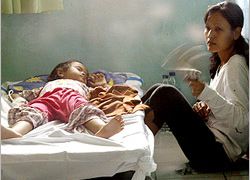Cheap malaria drug offers new hope
India’s Ranbaxy Laboratories has said it has developed a new anti-malarial drug claiming it will cost less, but work as well as costlier drugs now being used.

The drug, a synthetic peroxide code named OZ developed with the Geneva-based aid group Medicines for Malaria Venture, is now undergoing clinical trials in Britain, a Ranbaxy statement said on Wednesday.
“Our scientists are excited to be able to work on a drug that could save millions of lives,” Ranbaxy Chief Executive Officer Brian Tempest said in the statement.
The statement said the new drug would work as well as artemisinin, a currently available anti-malarial drug, and would be much cheaper.
Artemisinin is a herbal remedy based on the Artemisia annua plant. However, because of the costly and lengthy extraction process from the plant, artemisinins are at least 10 times more expensive than the cheap standard antimalarials.
Artemisinin combination therapy costs about $2 (1.6 euros) a dose, an amount beyond the reach of many in poor countries. Cheap medicines such as chloroquine no longer cure the disease in Africa because malaria parasites have become resistant to it. Resistance is also spreading in India.
Malaria, which is carried by mosquitoes, kills more than one million people a year, with |
“We know about this synthetic peroxide developed by Ranbaxy. The reports that we have heard about it are certainly very promising,” said Allan Schapira, coordinator of strategy and policy for the World Health Organisation’s Rollback Malaria campaign.
But knowledge about the drug is “insufficient to make a judgment at the moment”, Schapira said. “We hope that it will prove highly efficacious.”
Findings from tests on the new drug are being published in the 19 August issue of the science journal Nature.
Malaria, which is carried by mosquitoes, kills more than one million people a year, with 90% of the deaths occurring in Africa, according to the United Nations. Most of the victims are children under the age of five.
Malaria also costs Africa an estimated $12 billion a year in lost gross domestic product and drains 40% of its public-health spending.
“The need to develop a low-cost, potent, synthetic anti-malarial drug is more urgent than ever,” said Christopher Hentschel, chief executive of Medicines for Malaria Venture. “This could be the biggest breakthrough in malaria treatment of our generation.”